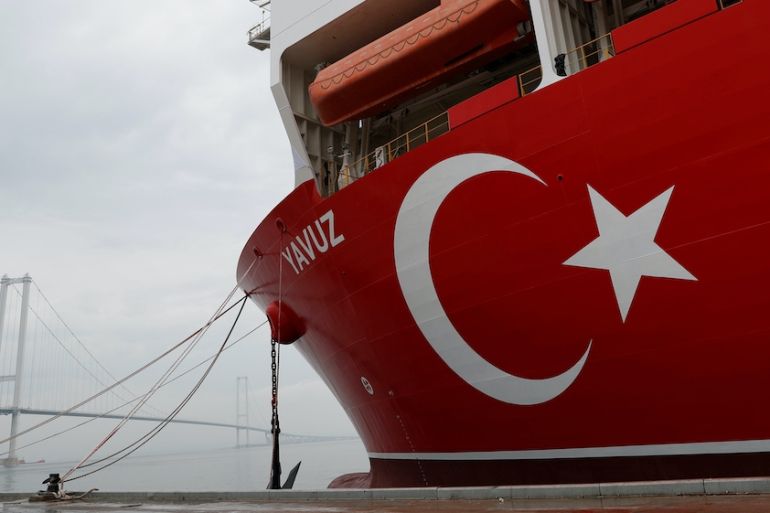Turkey defies EU by sending drilling ship to waters off Cyprus
Turkey sent the Yavuz drilling vessel to an area off the southwestern coast of Cyprus on Tuesday.

Turkey dispatched a drilling ship to an area off the southwestern coast of Cyprus on Tuesday, in a move that could fuel territorial disputes with EU member states in the eastern Mediterranean.
Ankara resumed its search of the contested waters last week after German-mediated negotiations with Greece collapsed when Athens announced a maritime delimitation agreement with Egypt on Aug. 6 in retaliation to a similar deal between Turkey and Libya.
Keep reading
list of 4 itemsEU lawmakers approve ‘right to repair’ law
Why is Germany maintaining economic ties with China?
Are more European nations finally moving to recognise Palestine statehood?
The eastern Mediterranean has become an energy hot spot with big finds for EU member Cyprus, as well as Israel and Egypt in recent years. Turkey is now pushing to secure a share of the resources, defying warnings from the bloc that its unilateral actions could further strain ties.
France has temporarily beefed up its military presence in the region to ward against Turkey’s steps. Turkey on Monday accused France, Armenia and the United Arab Emirates of forming an alliance against Turkey. The UAE and Egypt are allies, while Armenia is a landlocked country and a historical rival of Turkey.
This “unravels the dimensions of an insidious alliance that is being attempted to be forged against Turkey,” the Foreign Ministry said in a statement. “No matter what, Turkey will resolutely continue to protect both her and Turkish Cypriots’ rights in the Eastern Mediterranean stemming from international law. No alliance of malice will manage to prevent this.”
After dispatching the Oruc Reis survey ship to the south of the Greek island of Kastellorizo last week, Turkey added the 230-meter (755-foot) long Yavuz drilling vessel on Tuesday. It’s accompanied by three offshore supply ships under the protection of the Turkish navy. “All vessels are strongly advised not to enter this area,” a Turkish navy website said Saturday as it designated exploration areas off-limits through Sept. 15.
Turkey – which sent troops and captured the northern third of Cyprus in the wake of a 1974 coup aimed at uniting the island with Greece – doesn’t recognize Cyprus as a sovereign country and opposes Cypriot drilling without an agreement on sharing any proceeds with the Turkish Cypriots.
The internationally recognized government of the Republic of Cyprus has licensed several offshore exploration blocks, some of them located in disputed waters. Cyprus has an agreement with Exxon Mobil, Total SA and Eni SpA for oil and natural gas exploration rights near an area where Turkey wants to drill.
Ankara also doesn’t recognize Greece’s claim that its territorial waters start immediately south of the island of Kastellorizo, the most distant Greek outpost in the contested area. It argues that a country’s continental shelf should be measured from its mainland. Greece says that islands must also be taken into account in delineating a country’s continental shelf, in line with the UN Law of the Sea.
“The escalation of the Turkish provocation is directed against Europe and the response must be escalated accordingly,” Greek Foreign Minister Nikolaos Dendias said after meeting with his Cypriot counterpart Nicos Christodoulides in Nicosia.
Recent developments is the region will affect EU-Turkish relationship, Christodoulides said. Both ministers made clear that their countries stand ready to enter into a discussion with their neighboring countries as long as this dialogue will take place under the international law.
(Updates with Greek and Cypriot foreign ministers from ninth paragraph.)
–With assistance from Georgios Georgiou.